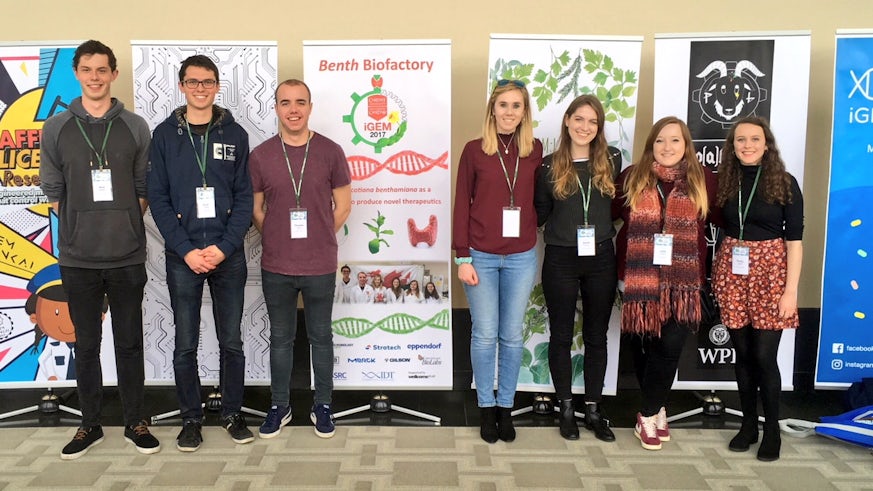Cardiff University students recognised at global science competition
21 November 2017

Students from the School of Biosciences and School of Chemistry at Cardiff University have been recognised in a global competition for using tobacco plants to help create a novel treatment for Graves’ disease.
Plants are increasingly used for the production of therapeutics, including the vaccinations for Polio and Ebola. Students from Cardiff University have used this concept to develop therapeutics for thyroid disease in a nine-month project.
In November the Cardiff_Wales team flew to the USA in November to take part in the International Genetically Engineering Machine competition, iGEM, to compete against 300 teams from all over the world and showcase their work.
Students from the School of Biosciences and the School of Chemistry embarked on a project to attempt to use tobacco plants to produce a novel protein designed to treat the symptoms of Graves’ disease, an autoimmune disorder that affects about 3 percent of women.
Helen Davies, Sarah Clinton, Niall Coates, Ryan Coates, Jade Hughes, Emily Heath and Thomas Sage worked together to utilise the Nicotiana benthamiana leaf expression system to generate high levels of a protein that might be used as a therapeutic.
The students started to work on their project in the spring semester, working in the labs within the Sir Martin Evans building throughout the summer to analyse their data, before they travelled to Boston to compete against teams from across the world.
The iGEM judges were impressed with their research project and awarded them a top 4 finish in the super competitive undergraduate Therapeutics Track competition.
Cardiff_Wales was funded and supported by the School of Biosciences, the School of Chemistry and CUROP within Cardiff University, who supplied three studentships for summer research.
One of the students will go on to study and develop this project further as part of their undergraduate research project.
The Cardiff team was brought together and supervised by Dr Geraint Parry, a plant cell biologist who works on the GARNet grant within the School of Biosciences at Cardiff University.
Dr Parry said: “We are delighted to have secured this outstanding final position in the Therapeutics track as it truly reflects the exceptionally hard work that the team has put in throughout the year.
“Developing a complex multi-faceted project over such a short time period is not trivial and the student’s commitment is reflected with this great final result.
“I am now recruiting our team for 2018 team. We welcome students from any subject area to take part.”
If you would like to find out more, please contact Parryg5@cardiff.ac.uk.
Find out more about their project here: http://2017.igem.org/Team:Cardiff_Wales